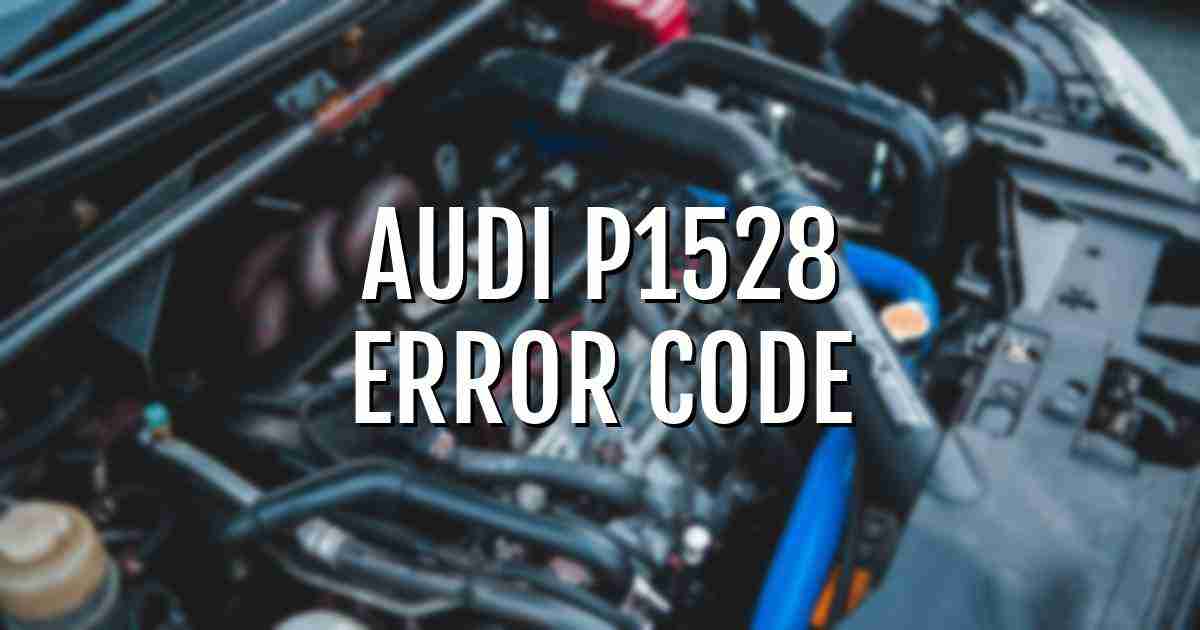The OBD code P1528 for Audi indicates an issue with the Intake Camshaft Control Solenoid.
Symptoms include the Engine Light being ON.
This code is usually caused by a faulty solenoid, open/shorted harness, or poor electrical connection.
It’s important to address this promptly to prevent engine performance issues.
A possible fix involves inspecting the wiring harness and connectors for any damage or corrosion.
| Repair Importance Level | 10.0 (Out of 10) |
| Estimated Repair Time | Approximately 1.0 hour |
| Repair Difficulty Level | 6.67 (Out of 10) |
I know how frustrating it is to see that warning light pop up again and again. You don’t need to spend money at the mechanic just to clear it. With this pocket-friendly automatic car scanner, you can do it yourself in seconds and and avoid the time and inconvenience of driving to a mechanic. Just plug it in, connect to your Android or iOS phone, and instantly see live data. Understand the fault code, clear it right away, and decide if it’s something urgent or if you’re good to drive. It even monitors your car and sends notifications to your phone, so you’re always in control. Simple, fast, and stress-free—today’s offer price!
Symptoms of the Audi p1528 OBD Code
The Audi P1528 fault code typically triggers when there is an issue with the vehicle’s throttle control system.
- Symptoms: Engine Light ON.
- Rough idle may be experienced.
- Loss of power during acceleration.
- Engine may stall at times.
Causes of the Audi p1528 OBD Code
Do you know you can clear most fault codes—but some could mean serious danger? Don’t take chances with your safety or your family’s safety. This budget-friendly car scanner makes it easy to clear fault codes in seconds while showing you exactly what’s wrong. Plug it in, connect to your Android or iOS phone, and instantly check live data. You’ll know if it’s a minor issue you can clear or something serious that needs attention—so you can drive safely and stress-free. (Today’s Deal)
P1528 in Audi indicates an issue with the intake manifold runner control circuit malfunction.
- P1528 can be caused by a faulty Intake Camshaft Control Solenoid.
- An open or shorted Intake Camshaft Control Solenoid harness.
- A poor electrical connection in the Intake Camshaft Control Solenoid circuit.
Fixing Audi Error Code p1528 Step By Step
Address the issue by inspecting the intake manifold runner control system for Audi fault code P1528.
- To fix Audi OBDII code P1528, first, review the possible causes related to this fault code.
- Visually examine the wiring harness and connectors associated with the throttle body.
- Check for any damaged components and inspect the connector pins for signs of being broken, bent, pushed out, or corroded.
- If no issues are found with the wiring and connectors, proceed to test the throttle body for proper operation.
- Clean the throttle body and perform a throttle body adaptation procedure if necessary.
- Reset the fault code using a diagnostic scanner and test drive the vehicle to ensure the code does not return.
- If the code persists, consider replacing the throttle body assembly with a new unit to resolve the issue.
Cost Of Fixing Audi p1528 Fault Code
Diagnosing and repairing fault code P1528 on an Audi may involve addressing issues with the throttle control system.
The cost to diagnose and fix the Audi OBD code P1528 typically ranges from $75 to $150 per hour for labor rates.
With an estimated repair time of 1. 0 hour, the total cost can be around $75 to $150, depending on shop rates and the complexity of the issue.
Details of the Audi p1528 OBD Code
Audi fault code P1528 relates to an issue with the intake manifold runner control circuit.
Audi OBD code P1528 means that the intake manifold runner control circuit is stuck open on bank 1. This code is triggered by the Engine Control Module (ECM) when it detects that the intake manifold runner control is not functioning properly.
The intake manifold runner control system helps optimize engine performance and efficiency by adjusting the length of the intake runners.
When the circuit is stuck open, it can lead to drivability issues and a decrease in engine performance.
Mechanic’s Tech Notes
For Audi fault code P1528, refer to detailed diagnostic information for troubleshooting guidance.
To diagnose Audi OBDII code P1528, check the Transmission Control Module (TCM) power and ground using a multimeter.
Verify TCM communication over the Controller Area Network (CAN) using a scan tool.
If the TCM does not respond, reprogramming or reflash may be necessary.
Visually inspect the wiring harness and connectors for any damage, and check for broken, bent, or corroded pins.
Ensure proper connections and continuity in the TCM circuit.
Address any issues found during inspection to resolve the P1528 fault code.
FAQ
Common symptoms of OBD code P1528 in an Audi include Engine Light ON. Causes may be a faulty Intake Camshaft Control Solenoid or related wiring issues. Fix: Inspect and repair as needed.
OBD code P1528 in Audi vehicles is typically caused by a faulty Intake Camshaft Control Solenoid, open/shorted harness, or poor electrical connection. Inspect and repair as needed.
Diagnose and repair OBD code P1528 in your Audi by checking for a faulty Intake Camshaft Control Solenoid, harness issues, or poor electrical connections. Inspect and repair as needed.

Wrap Up
If your Audi is displaying OBD code P1528, you may experience rough idling, poor acceleration, or stalling.
This code typically indicates an issue with the throttle control system, such as a faulty throttle position sensor, throttle body malfunction, or wiring problem.
To address Audi OBD code P1528, start by inspecting the throttle position sensor and its wiring harness for any signs of damage or corrosion.
Test the sensor’s output voltage and ensure proper connection at the throttle body.
Consider cleaning the throttle body and performing a throttle adaptation procedure if needed.

